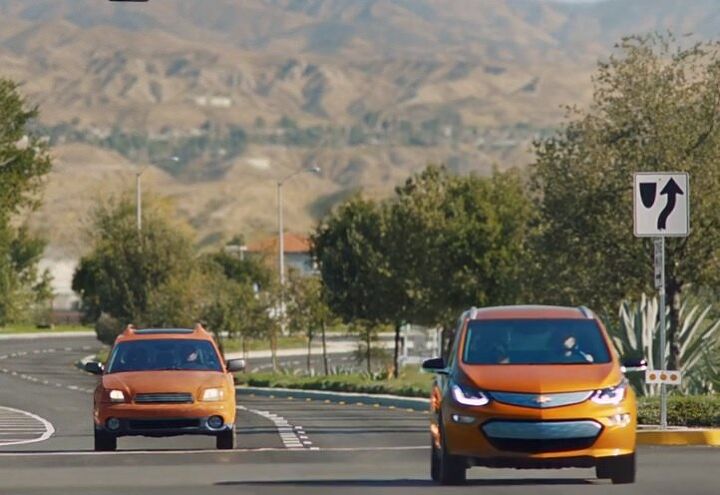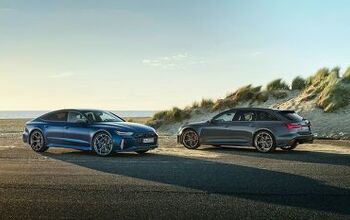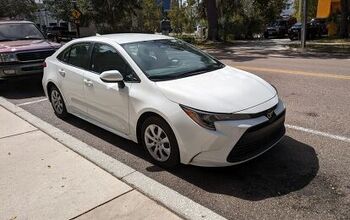Dealer Association Chair: Relax, Critics - Electric Car Owners Still Have to Visit the Shop

National Automobile Dealers Association chairman Wes Lutz doesn’t have much time for critics who claim traditional car dealers don’t want to sell you an electric vehicle. As EVs boast fewer moving parts and lower running costs, green car advocates often say dealerships view the vehicles as a threat to a business model that relies heavily on service visits for profit.
Not so, says Lutz. The parts that do move are the ones they profit from.
Speaking at an Automotive Press Association event in Detroit, Lutz, who runs a Chrysler Dodge Jeep Ram dealer in Jackson, Missouri, threw cold water on critics’ assertions, Wards Auto reports. Fiat Chrysler, of course, is not known for its love of electric vehicles.
“First off, I don’t make money on oil changes,” he said. “And these days, vehicle are going 7,500 miles between oil changes anyway. Try to make money selling $30 oil changes that cost $40 in goods, labor and overhead. Unfortunately, you can’t make that up in volume.”
Continuing with his internal combustion tangent, Lutz said, “I haven’t made my living on engine or transmission work on vehicles I’ve sold new in more than a decade, and neither has any other franchised dealer.”
The revenue flowing into this store via the service shop comes mainly from tires, brakes, suspension work, alignments, and electrical work, he claimed — maintenance that’s unavoidable on electric vehicles. Nor does Lutz believe EVs have lower drivetrain maintenance costs compared to ICE cars, as he hasn’t seen any studies to back this up. “It sort of sounds true,” he admits. It’s still a fledgling market, and most owners of (until now) relatively low-ranged, non-Tesla EVs haven’t accumulated high mileage.
Still, battery degradation isn’t often talked about, mainly because instances of depleted packs are not as common as initially feared. Both the Nissan Leaf and Chevrolet Bolt carry eight-year, 100,000-mile warranties on their battery packs, with some differences between the two coverage plans. It will be interesting to see what widespread, long-term use of the larger-ranged second-gen Leaf and the Bolt leads to in terms of replacement rates.
If drivetrain maintenance costs for EVs are truly on par with ICE vehicles, dealers shouldn’t mind studies showing lower total cost of ownership for EV drivers. A 2017 British study (showing TOC of several vehicle types in California, Texas, and the UK) claims that, overall, maintenance costs are greater on an ICE vehicle, but those costs include oil and filter changes, coolant flushes, etc. They also take into account reduced brake wear due to regenerative braking. Newer electric vehicles seek to capitalize on this system, allowing drivers to slow — and even stop — the car by lifting off the accelerator.
That’s not good for service shop revenue, but a car’s brakes do not exist in a vacuum.
[Image: Electrify America/Plug in to the Present]

More by Steph Willems
Latest Car Reviews
Read moreLatest Product Reviews
Read moreRecent Comments
- Kjhkjlhkjhkljh kljhjkhjklhkjh I'd rather they have the old sweep gauges, the hhuuggee left to right speedometer from the 40's and 50's where the needle went from lefty to right like in my 1969 Nova
- Buickman I like it!
- JMII Hyundai Santa Cruz, which doesn't do "truck" things as well as the Maverick does.How so? I see this repeated often with no reference to exactly what it does better.As a Santa Cruz owner the only things the Mav does better is price on lower trims and fuel economy with the hybrid. The Mav's bed is a bit bigger but only when the SC has the roll-top bed cover, without this they are the same size. The Mav has an off road package and a towing package the SC lacks but these are just some parts differences. And even with the tow package the Hyundai is rated to tow 1,000lbs more then the Ford. The SC now has XRT trim that beefs up the looks if your into the off-roader vibe. As both vehicles are soft-roaders neither are rock crawling just because of some extra bits Ford tacked on.I'm still loving my SC (at 9k in mileage). I don't see any advantages to the Ford when you are looking at the medium to top end trims of both vehicles. If you want to save money and gas then the Ford becomes the right choice. You will get a cheaper interior but many are fine with this, especially if don't like the all touch controls on the SC. However this has been changed in the '25 models in which buttons and knobs have returned.
- Analoggrotto I'd feel proper silly staring at an LCD pretending to be real gauges.
- Gray gm should hang their wimpy logo on a strip mall next to Saul Goodman's office.


































Comments
Join the conversation
This article needs editing. The store owned by Wes Lutz - Extreme- is located in Jackson, MICHIGAN, not MISSOURI. Thanks.
My co-worker's all electric Fiat 500E has locked him out of his car because the accessory battery died at just under 2 years, can't get winter tires for his car because the wheels are a rare bolt pattern and the tires that came with the car are an uncommon tire size. It has spent its share of time in the shop for various electrical issues. But then, that's not a "normal" electric car. It's a Fiat.